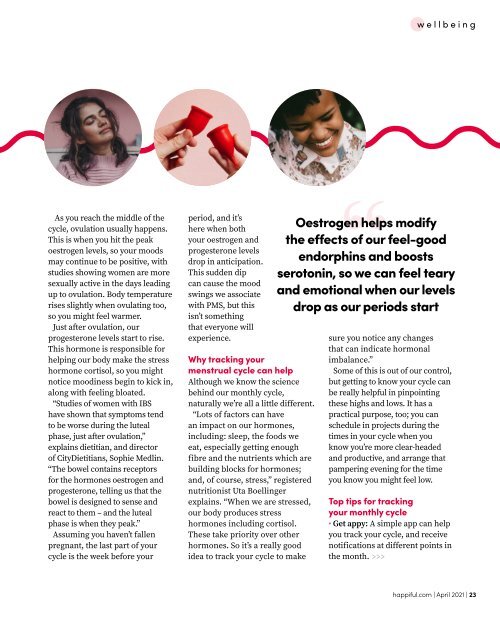Create successful ePaper yourself
Turn your PDF publications into a flip-book with our unique Google optimized e-Paper software.
wellbeing<br />
As you reach the middle of the<br />
cycle, ovulation usually happens.<br />
This is when you hit the peak<br />
oestrogen levels, so your moods<br />
may continue to be positive, with<br />
studies showing women are more<br />
sexually active in the days leading<br />
up to ovulation. Body temperature<br />
rises slightly when ovulating too,<br />
so you might feel warmer.<br />
Just after ovulation, our<br />
progesterone levels start to rise.<br />
This hormone is responsible for<br />
helping our body make the stress<br />
hormone cortisol, so you might<br />
notice moodiness begin to kick in,<br />
along with feeling bloated.<br />
“Studies of women with IBS<br />
have shown that symptoms tend<br />
to be worse during the luteal<br />
phase, just after ovulation,”<br />
explains dietitian, and director<br />
of CityDietitians, Sophie Medlin.<br />
“The bowel contains receptors<br />
for the hormones oestrogen and<br />
progesterone, telling us that the<br />
bowel is designed to sense and<br />
react to them – and the luteal<br />
phase is when they peak.”<br />
Assuming you haven’t fallen<br />
pregnant, the last part of your<br />
cycle is the week before your<br />
period, and it’s<br />
here when both<br />
your oestrogen and<br />
progesterone levels<br />
drop in anticipation.<br />
This sudden dip<br />
can cause the mood<br />
swings we associate<br />
with PMS, but this<br />
isn’t something<br />
that everyone will<br />
experience.<br />
Why tracking your<br />
menstrual cycle can help<br />
Although we know the science<br />
behind our monthly cycle,<br />
naturally we’re all a little different.<br />
“Lots of factors can have<br />
an impact on our hormones,<br />
including: sleep, the foods we<br />
eat, especially getting enough<br />
fibre and the nutrients which are<br />
building blocks for hormones;<br />
and, of course, stress,” registered<br />
nutritionist Uta Boellinger<br />
explains. “When we are stressed,<br />
our body produces stress<br />
hormones including cortisol.<br />
These take priority over other<br />
hormones. So it’s a really good<br />
idea to track your cycle to make<br />
Oestrogen helps modify<br />
the effects of our feel-good<br />
endorphins and boosts<br />
serotonin, so we can feel teary<br />
and emotional when our levels<br />
drop as our periods start<br />
sure you notice any changes<br />
that can indicate hormonal<br />
imbalance.”<br />
Some of this is out of our control,<br />
but getting to know your cycle can<br />
be really helpful in pinpointing<br />
these highs and lows. It has a<br />
practical purpose, too; you can<br />
schedule in projects during the<br />
times in your cycle when you<br />
know you’re more clear-headed<br />
and productive, and arrange that<br />
pampering evening for the time<br />
you know you might feel low.<br />
Top tips for tracking<br />
your monthly cycle<br />
• Get appy: A simple app can help<br />
you track your cycle, and receive<br />
notifications at different points in<br />
the month. >>><br />
happiful.com | <strong>April</strong> <strong>2021</strong> | 23

















